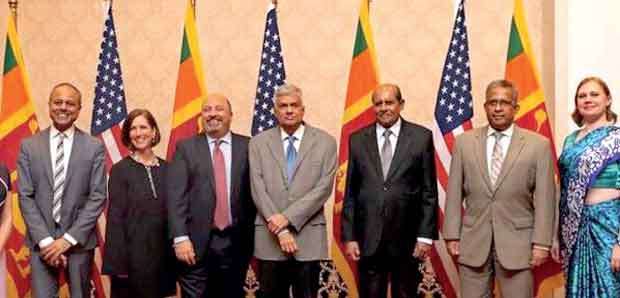Reply To:
Name - Reply Comment
Last Updated : 2024-04-24 09:57:00

 The available information on the return of the US Peace Corps (USPC) to Sri Lanka on the stated mission of ‘English language education’ raises many questions, given the timing and context of their arrival. Under the terms of the agreement signed between the Minister of Foreign Affairs and the Acting Director of the Peace Corps in February, the first 25 volunteers will arrive in the country in September 2019 for their two year assignments. This is likely to coincide with the run-up to the next presidential election which, according to the constitution, has to be held by December 9, 2019 the latest. The volunteers along with the members of their households as well as ‘persons performing functions under contract’ by them,are to be granted diplomatic privileges under the Vienna Convention on Diplomatic Relations, that would exempt them from taxes and customs duties, “as provided to members of the administrative and technical staff of the Embassy of the United States,”according to a report in the Sunday Times (ST) of July 8, 2018.
The available information on the return of the US Peace Corps (USPC) to Sri Lanka on the stated mission of ‘English language education’ raises many questions, given the timing and context of their arrival. Under the terms of the agreement signed between the Minister of Foreign Affairs and the Acting Director of the Peace Corps in February, the first 25 volunteers will arrive in the country in September 2019 for their two year assignments. This is likely to coincide with the run-up to the next presidential election which, according to the constitution, has to be held by December 9, 2019 the latest. The volunteers along with the members of their households as well as ‘persons performing functions under contract’ by them,are to be granted diplomatic privileges under the Vienna Convention on Diplomatic Relations, that would exempt them from taxes and customs duties, “as provided to members of the administrative and technical staff of the Embassy of the United States,”according to a report in the Sunday Times (ST) of July 8, 2018.
US President John F. Kennedy when he created the Peace Corps in 1961 stated that its goal was to allow American citizens to serve the cause of ‘world development.’ He said it “is not designed as an instrument of diplomacy or propaganda or ideological conflict.” USPC volunteers were expected to work with poor communities in developing countries,enjoying no special privileges.
Though there is supposed to be a strict separation between the USPC and any intelligence activity of the US government, its chequered history has shown that it has often been accused or suspected of being involved in espionage in the host country, and being asked to leave.Among countries USPC had to leave are Indonesia (1965), Guinea (1966), Sri Lanka (1971), India (1976) and Cambodia (2017). In Bolivia, in 2008, a US embassy official was charged with espionage, sent home and not allowed to return. ABC News revealed that 30 USPC volunteers, as well as a Fulbright scholar, had been asked by the official to spy on Cubans and Venezuelans living in Bolivia. The US embassy in La Paz acknowledged the incident, reports said.
Richard Haas, head of the Council on Foreign Relations even suggested that the rules be relaxed so that USPC, along with American journalists and members of the clergy, could work as agents or as cover for the CIA’s intelligence gathering, the Washington Post (WP) reported in1996. The astounded USPC Director Mark Gearan responded at the time saying the suggestion was ‘both dangerous and cynical.’
The US move to send the Peace Corps to Sri Lanka needs to be viewed in the context of the larger plans in the region it calls the ‘Indo Pacific
“Peace Corps volunteers often serve in remote areas of their host countries without access to modern communications or special security arrangements. They are not government employees, are paid only a small subsistence allowance and are not granted any special privileges, such as diplomatic immunity. They are prohibited from involving themselves in the political affairs of their host countries,”Gearan wrote, in the WP.
The move by the government of Sri Lanka (GoSL) of granting USPC diplomatic privileges comes across as doubly odd in the light of Gearan’s description of the volunteers. According to the ST, the government has also exempted from taxes, customs duties and other charges “all equipment, supplies, and other goods and services introduced into or acquired in Sri Lanka by the US Government or any contractor financed by it,” under the agreement. It would be interesting to know what costly‘equipment’ is being brought into the country by the USPC for the purpose of ‘English teaching,’ that requires suchtax concessions.The inclusion of ‘contractors’ too under this exemption is of concern, seeing that private contractors hired to carry out projects forthe US government have on occasion been accused of being CIA fronts. It’s no consolation either, to know that the current US Secretary of State took up his post following directly from his job as CIA director in the Trump administration.
To come back to the question of English teaching (assuming that the USPC mission is bona fide): while there is no doubt that the school system throughout the country can benefit from more and better English teachers, one needs to ask whether Sri Lanka’s own English teaching community with their decades of experience wouldn’t be better able to handle the challenges involved in teaching English in a post-colonial context, given also the fast-changing present day social environment, than a few dozen foreign volunteers flown in for a couple of years.
The US embassy says the Sri Lanka English Teachers Association (SLETA) will ‘work closely’ with the volunteers. But who sets the priorities and who makes the decisions? Wouldn’t the SLETA and Sri Lanka’s own educationists be better positioned to improve the English teaching programme themselves, in a way that complements their ongoing work, if the funding and resources were turned over to them? Its hard to avoid the conclusion that, on the balance, the party benefiting more from this exercise will be not the Sri Lankans but the American volunteers, who will gain useful exposure to a different culture, language and value system through grass-roots interactions with local communities.
It’s interesting to note that in India - in the context of efforts to revive the USPC programme that was phased out in 1976 - John Chromy, Special Assistant to the Director of Peace Corps (1976) observed that “India in the past decade has moved rapidly into a modern economy and sees itself not as a recipient of aid assistance but in fact a donor of assistance to other countries much poorer then India.” Sri Lanka’s situation may not comparable to that of a regional power like India, but as a middle income country its worth considering whether this is the kind of ‘aid’ that it needs.
30 USPC volunteers, and a Fulbright scholar, were asked by the official to spy on Cubans and Venezuelans living in Bolivia
Acting Director of USPC Sheila Crowley expressed gratitude “to the Government and people of Sri Lanka for their invitation” to the USPC to return. However it is news to “the people of Sri Lanka” that they had extended such an invitation. The GoSL is reported to have invited the USPC back in 2016, but it is only now that this is being made known.
The US move to send the Peace Corps to Sri Lanka needs to be viewed in the context of the larger plans in the region it calls the ‘Indo Pacific.’The $39 million in ‘military financing’ to Sri Lanka announced last week would be part of the $300 million reportedly pledged by US Secretary of State Mike Pompeo earlier in Singapore, on the sidelines of an ASEAN foreign ministers’ meeting,“to reinforce security cooperation” throughout the region (meaning, to push back against China).
In Sri Lanka though the US cut back its development assistance, it has been investing large sums in programmes of its own design at every level. Military ties are being pursued with frequent ship visits and joint military exercises. Not only the military, but the legislative and executive branches of government, as well as the legal system and local government, have by now been virtually ‘mapped’ in terms of their infrastructure, human resources, capacities etc.,through USAID and other programmes. The GoSL tells the public little,if anything, about these projects and it is not clear if there is any accountability to anyone on the Sri Lankan side, regarding the use of these considerable funds. Against this backdrop, its worth asking, is the USPC mission; nothing more than yet another aspect of the US penetration of Sri Lanka - this time at the grassroots, community level?
gammini Thursday, 23 August 2018 09:38 AM
You are spot on. Their arrival date is no coincident with the next Presidential election.They are going to interfere with our elections,ironically they claim to be victims of similar thing perpetrated by the Russians,to make sure that the most bizarre and unintelligent Prime Minister in Sri Lankan history is elected this time to be the President.
sammy cooper Thursday, 23 August 2018 12:22 PM
Sri Lankans shouldn't be presumptuous and overstate their strategic importance. The writer could've become an English teacher if she has real concerns.

Add comment
Comments will be edited (grammar, spelling and slang) and authorized at the discretion of Daily Mirror online. The website also has the right not to publish selected comments.
Reply To:
Name - Reply Comment
US authorities are currently reviewing the manifest of every cargo aboard MV
On March 26, a couple arriving from Thailand was arrested with 88 live animal
According to villagers from Naula-Moragolla out of 105 families 80 can afford
Is the situation in Sri Lanka so grim that locals harbour hope that they coul